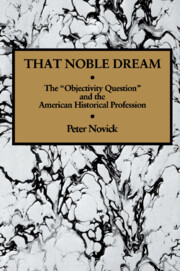Book contents
11 - A convergent culture
Published online by Cambridge University Press: 29 March 2011
Summary
As we saw in our consideration of the period before World War I, consensual values within the historical profession, and an overwhelmingly affirmative stance toward the American experience, resulted in a convergent, celebratory historiography, which in turn promoted confidence in the objectivity of the work produced. Between the wars this pattern was reversed: a breakdown in consensus, and an undercurrent of “negativism,” contributed to a questioning of the norm of objectivity. After World War II the pattern was reversed once more, with an affirmative and consensual historiography again contributing to confidence in the old ideal. Looking back on Renaissance scholarship in the 1950s from the perspective of a quarter century, William J. Bouwsma noted the “abiding consensus among historians of any complex subject.” He thought the “irenic mood … [the] amiable but slightly complacent consensus” was in part “a reflection of the general consensus of the Eisenhower years, when we were all beating our swords into ploughshares.”
The relativist critique had, as we have seen, been associated with an insurgent mood, a critical tone, and an adversarial posture. In the postwar decades all these were out of fashion. Orthodoxy, not heterodoxy, was à la mode. “Radical” interpretations were abandoned; dissidents were increasingly marginalized. Relativism had developed in contingent but intimate relationship with “progressive” interpretations of the American past, which stressed social conflict, the struggle of “the people” against “the interests.”
- Type
- Chapter
- Information
- That Noble DreamThe 'Objectivity Question' and the American Historical Profession, pp. 320 - 360Publisher: Cambridge University PressPrint publication year: 1988
- 3
- Cited by



